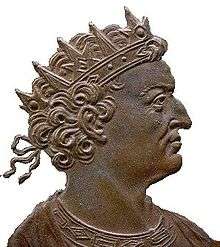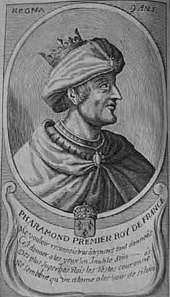Pharamond
Pharamond[1] or Faramund (c. 365 – 430) is a legendary early king of the Franks, first referred to in the anonymous 8th-century Carolingian text Liber Historiae Francorum, also known as the Gesta regnum Francorum. In this work, which is customarily dated to 727, the anonymous author begins by writing of a mythical Trojan origin for the Franks. The emphasis of the Liber was upon "construct[ing] a specific past for a particular group of people."[2]
Pharamond | |
|---|---|
 A portrait of the king pharamond | |
| Born | 365 |
| Died | 430 (65 years old) |
| Occupation | politician |
| Children | Chlodio |
| Parent(s) |
|
Legend
The story is told of the election of the first Frankish king.[3] It says that after the death of Sunno, his brother Marcomer, leader of the Ampsivarii and Chatti, proposed to the Franks that they should have one single king, contrary to their tradition. The Liber adds that Pharamond, named as Marcomer's son, was chosen as this first king (thus beginning the tradition of long-haired kings of the Franks), and then states that when he died, his son Chlodio was raised up as the next king. The work says no more of him.
Because there is no reference in any source prior to this work[4] to this figure named Pharamond, who is placed prior to Chlodio (that is, before ca. 428), scholars consider him a legendary rather than historical figure.[5] As a matter of fact in several sources, for example Gregory of Tours, multiple kings are attested to rule simultaneously in later times. It is thus a dubious matter to assume that, even if Pharamond existed, he was ever recognized as sole king. The first king of the Franks who may have been close to this position was Clovis I, but after his death his empire was divided again amongst his sons, who ruled again simultaneously.
The myth of Pharamond has led to new legends and romances in later times. In past times this has led to attempts to falsely write Pharamond into Prosper Tiro.[6] Martin Bouquet at a much later date invented an entire history of Pharamond.
Historical sources
Sigebert of Gembloux names him as King of the Franks between Marcomer and Chlodio ("Post Marcomirum filius ejus Faramundus fuit, rex crinitus, a quo Franci crinitos reges habere coeperunt. Post quem Clodius filius ejus regnans Francis a Thoringia advectis Gallias invasit, et capta urbe Tornaco Cameracum usque progressus multos Romanorum in Galliis peremit" ). He keeps the mythical origin for Marcomer.
Saint Gregory wrote about a group of Trojans that escaped to the Maeotian marshes, then into Pannonia, becoming the Sicambri (a subdivision of the Franks), who inhabited the region along with the Alans. The Alan presence in Pannonia is historical around 370, as part of their migrations to Gaul, and later to Hispania, where they ruled until the arrival of the Visigoths. He says that later, the Franks migrated to Germania led by Marcomer, and established themselves along the Rhine. After Marcomer's death, Pharemundus, or Faramundus succeeded him as chieftain.
In Gesta Francorum (c.1100), chapter 8 describes how the Franks changed their laws under Pharamond . ( page 229)
Pharamond in later culture

A Pharamond appears as the king of France in the Prose Tristan and later Arthurian works.
Pharamond is mentioned in William Shakespeare's Henry V, Act I, Scene 2, as the originator of the Salic law banning women from succession to the throne of France.
He appears as the title character in the opera Faramondo by George Frideric Handel.
A character named Pharamond appears in the Sandman and Lucifer comics series.
Alluded to in Victor Hugo's The Hunchback of Notre-Dame after Jehan Frollo's arrow pierces the left arm of Quasimodo the hunchback: "This no more disturbed Quasimodo than a scratch would have bothered King Pharamond." (Cobb translation)
Faramund is the faction leader of the Franks and a playable character in the PC video game Total War: Attila when beginning a Grand Campaign, with a begin date of 395 AD. He is the son of the former deceased faction leader Marcomer.
A descendant of the French kings, named Pharamond after his ancestor ("first king of France"), is the main character in Jean Raspail's novel Sire.
Notes
- Familysearch.org
- McKitterick, History and Memory in the Carolingian World, p.8
- Liber Historiæ Francorum 4-5, MGH Scriptores rerum Merovingicarum II, ed. B. Krusch, Hanover, 1888, pp. 245-246
- Wood, Ian. The Merovingian Kingdoms, 450-751. 1. Essex, England: Longman Group Limited, 1994. p.37
- Wood, The Merovingian Kingdoms, p. 36.
- Gibbon, Edward. The History of the Decline and Fall of the Roman Empire. ed. Rev. H. H. Milman. Boston: Phillips, Samson, and Company, 1852. Vol. 3, p.314 Ftn.169. 6 vols.
References
| Wikimedia Commons has media related to Pharamond. |
- Liber Historiae Francorum, translated by Bernard S. Bachrach. Coronado Press, 1973.
- Gregory of Tours. Historia Francorum.
- McKitterick, Rosamond. History and Memory in the Carolingian World. 1st Ed. Cambridge: Cambridge University Press, 2004.
- Wood, Ian. The Merovingian Kingdoms. Pearson Education, 1994.